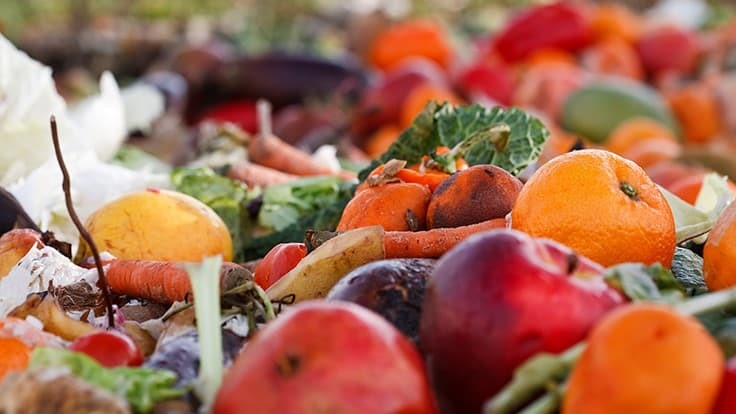Waste Today magazine, December 11, 2020, Posted by Adam Redling
The partnership is aimed at accelerating commitments to avoid or eliminate food waste first and repurpose what can’t be eliminated into renewable energy.
Vanguard Renewables, Wellesley, Massachusetts, announced on Dec. 10 that London-based Unilever, Seattle-based Starbucks, and the Dairy Farmers of America have joined the company in launching the Farm Powered Strategic Alliance (FPSA). According to the organization, the FPSA is aimed at accelerating long-term commitments to avoid or eliminate food waste first and repurpose what can’t be eliminated into renewable energy.
The FPSA commits to reducing food waste from manufacturing and the supply chain and repurposing any unavoidable waste that cannot be eliminated into renewable energy via Vanguard Renewables’ farm-based anaerobic digesters. The FPSA members also commit to begin exploring the process of decarbonizing their thermal energy usage by converting to farm-derived renewable natural gas.
“This unprecedented commitment by food industry leaders to the Farm Powered Strategic Alliance is a call-to-action for others to follow to impact climate change and shape a sustainable future for America and the planet,” John Hanselman, chairman and CEO of Vanguard Renewables, says. “This transformative movement will repurpose food waste that cannot be eliminated into renewable energy and low carbon fertilizer for farm use. Working with our Farm Powered Strategic Alliance partners, we plan to expand our organics recycling facility footprint to all major metro areas nationwide.”
Hanselman says he expects the FPSA to grow to include other U.S. food manufacturers and retailers and adds that the FPSA has the potential to not only reduce the members’ direct climate challenges, but to also reduce the hard-to-move Scope 3 emissions from their supply chain partners. These are indirect emissions that occur in the value chain of the reporting company. Hanselman also emphasized the impact the FPSA will have on helping sustain farms across America for future generations.
In the United States, more than 40 percent of all food produced ends up being discarded. While eliminating that waste is a priority, some of this unavoidable food waste is still sent to landfills or incinerators, but can be repurposed to produce renewable energy. Vanguard Renewables uses anaerobic digesters situated on farms to capture this energy and generate renewable natural gas or renewable electricity to be used in homes and manufacturing plants across the nation. Moreover, the process produces low carbon fertilizer that host farms use to support regenerative agriculture practices while it supports the American farmer with a diversified income stream.
“The Farm Powered Strategic Alliance is an impactful solution to tackling both food waste and carbon emissions,” Michael Kobori, Starbucks chief sustainability officer, says. “We’ve made great strides in eliminating food waste at the store level with our Starbucks Foodshare program, which has helped divert 25 million meals from landfills. The Farm Powered Strategic Alliance offers an innovative solution for our supply chain and brings us one step closer to our goal of a resource-positive future.”
Vanguard Renewables has seven operating facilities in the Northeast and more than 20 “Farm Powered” anaerobic digester facilities in permitting and development nationwide. These new facilities will provide organics recycling capacity for the current FPSA partners and have capacity to recycle organic waste from future FPSA members. The Farm Powered anaerobic digestion process combines manure from the dairy farm with food and beverage waste in the anaerobic digester and microorganisms convert sugars, fats and other compounds into renewable energy and low carbon fertilizer.
“Unilever is accelerating action to fight climate change, regenerate nature and preserve resources. We are excited to join the Farm Powered Strategic Alliance and are inspired by their vision to repurpose our unavoidable food waste to support renewable energy production and regenerative agriculture practice on farms across America. We cannot transition to a low carbon economy alone and encourage other businesses to join us in this crucial alliance,” Ale Eboli, head of supply chain operations for Unilever North America, says.
“Dairy Farmers of America has been working with Vanguard Renewables for more than six years to empower family farms and support a more circular economy,” David Darr, chief strategy and sustainability officer of Dairy Farmers of America, says. “Anaerobic digestion can change the economics and carbon footprint of a farm, allowing generational sustainability and energy independence. We are excited to see many more of our farms and dairy processing facilities taking advantage of the new carbon economy to make a positive impact on America.”
In addition to recycling organic waste and generating carbon negative renewable natural gas, hosting a Farm Powered anaerobic digester on a farm can make a financial difference for the host farmer.
“If you’re just going to milk cows or grow lettuce, that’s really hard because it’s cyclical; you need to be diversified and not depend upon just one income stream,” DFA member Peter Melnik of Bar-Way Farm in Deerfield, Massachusetts, says. “A lot of dairies have been really struggling; the Farm Powered anaerobic digester has been an important part of making our farm sustainable.”







